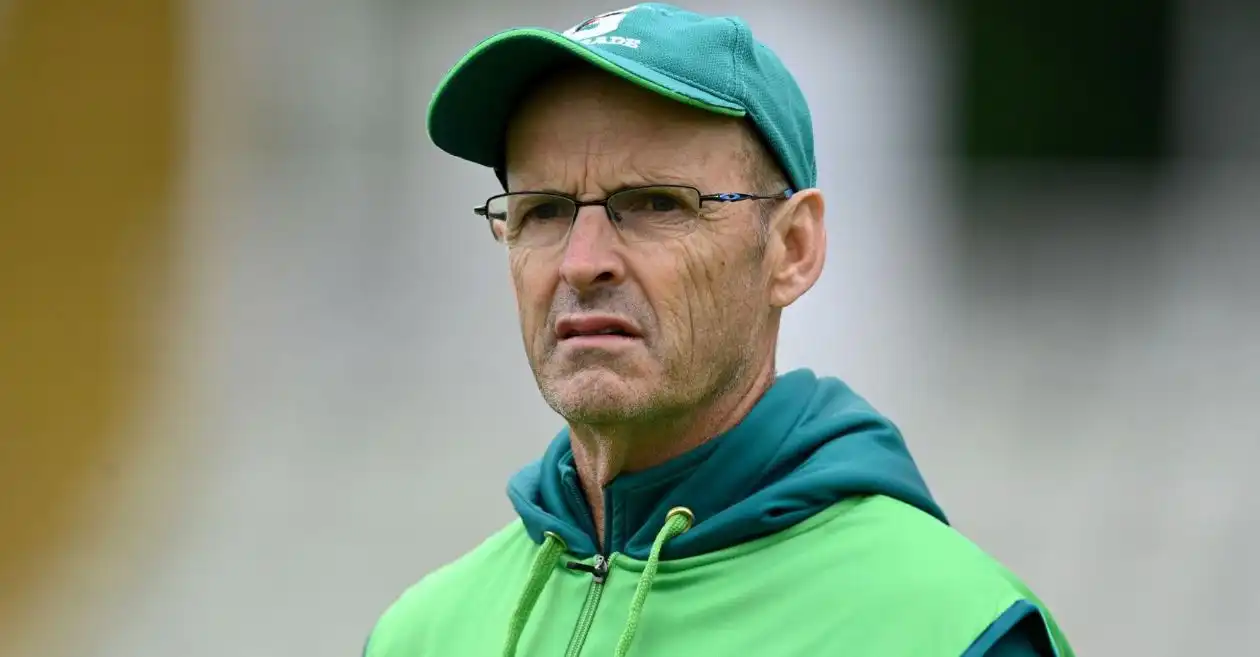In a significant development for Pakistan cricket, Gary Kirsten has officially resigned from his position as the white-ball coach, just six months into his two-year contract with the Pakistan Cricket Board (PCB). Kirsten’s departure comes at a critical juncture for the national team as they prepare for the ICC Champions Trophy 2025, which Pakistan is set to host. This resignation not only raises questions about the direction of the team but also highlights underlying tensions within the PCB.
Conflict with PCB Over Selection Authority
The primary reason behind Kirsten’s abrupt resignation stems from a rift between him and the PCB regarding selection authority. Initially, Kirsten and red-ball coach Jason Gillespie were part of the selection process for the national team. However, the PCB established a new selection committee, effectively sidelining the coaches and revoking their powers in team selection matters. This shift in authority led to rising tensions, with Gillespie openly expressing his disappointment and feeling relegated to a “match-day analyst” role. Although Kirsten chose to refrain from public comments on the matter, it became evident that he shared Gillespie’s discontent, marking a fundamental breakdown in communication and collaboration between the coaching staff and the PCB.
The situation highlights a broader issue within the PCB regarding the balance of power and the role of coaches in the selection process. When coaches are stripped of their selection authority, it not only undermines their position but also complicates their ability to build a cohesive team. As the PCB’s new approach to team selection took shape, it became increasingly clear that both Kirsten and Gillespie were feeling the strain of being left out of key decisions impacting the squad.
Kirsten’s Tenure: A Mixed Bag of Results
Kirsten’s tenure with the national team started with high hopes after he completed his commitments with the Indian Premier League (IPL) franchise, Gujarat Titans. His first assignment was a series against England, which the Pakistan team led by captain Babar Azam lost. This initial setback set the tone for a challenging term, which culminated in a disappointing performance at the T20 World Cup 2024. During the tournament, Pakistan faced unexpected defeats at the hands of co-hosts USA and later succumbed to arch-rivals India in a critical knockout match. These results raised questions about the team’s preparedness and overall strategy under Kirsten’s guidance.
In the aftermath of the T20 World Cup exit, Babar Azam made the difficult decision to step down as captain for the white-ball formats. This leadership change added further complexity to Kirsten’s situation, as he found himself navigating a squad in transition, struggling with morale and team dynamics. The loss of leadership combined with disappointing results created a perfect storm of challenges that proved too much for Kirsten to overcome during his short stint.
The Impact of Kirsten’s Departure on Pakistan Cricket
Kirsten’s exit is a significant setback for Pakistan cricket, particularly as the team gears up for the ICC Champions Trophy in 2025. With no white-ball games played since their T20 World Cup exit, the upcoming ODI and T20I series in Australia was viewed as critical preparation. The timing of Kirsten’s resignation leaves a vacuum in leadership and coaching just when the team needed continuity and guidance. This uncertainty could potentially hinder Pakistan’s performance in the upcoming international fixtures and raise doubts about their readiness for the Champions Trophy.
The impact of Kirsten’s departure is not limited to the immediate coaching scenario. It also raises concerns about the overall direction of Pakistan cricket, particularly in light of their struggles in white-ball formats. As the PCB looks to regain its footing and build a competitive squad, Kirsten’s resignation adds another layer of complexity to the already challenging landscape. The questions surrounding player selection, team morale, and effective leadership will need urgent attention if Pakistan aims to re-establish itself as a formidable force in international cricket.
Options for PCB Following Kirsten’s Departure
In the wake of Kirsten’s resignation, the PCB faces critical decisions regarding the future of the coaching staff. One immediate option could be to promote Jason Gillespie, who currently handles the red-ball side, to take on white-ball coaching duties on a temporary basis. Gillespie’s familiarity with the players and the team’s dynamics could provide some much-needed continuity during this turbulent period. However, whether he would be willing to take on this dual responsibility, given his expressed frustrations, remains uncertain.
Another potential alternative is to consider Aaqib Javed, the former fast bowler and current national selector. Javed has been credited with helping Pakistan address their long-standing struggles in home Test matches and has a wealth of experience in coaching. His promotion could inject fresh energy into the team while also maintaining continuity in the selection process. However, any decision regarding the coaching staff will need to be made swiftly, as time is of the essence with the Champions Trophy on the horizon.
The Future of Pakistan Cricket: Navigating Challenges Ahead
As the PCB navigates the fallout from Kirsten’s departure, the focus must shift towards rebuilding and establishing a clear vision for the future of Pakistan cricket. This involves not only addressing immediate coaching needs but also reassessing the overall structure and philosophy of the cricketing setup within the country. The PCB must find a way to balance the roles of coaches, selectors, and management to create a cohesive and unified approach towards team selection and development.
In light of the upcoming Champions Trophy, the PCB will need to ensure that the team is not only prepared but also motivated and mentally resilient. This will require building strong communication channels between the coaching staff and the players, allowing for open discussions about performance expectations, strategies, and individual roles within the team. Additionally, establishing a supportive environment that fosters growth and development will be crucial in maximizing the potential of the players.
A Pivotal Moment for Pakistan Cricket
In conclusion, Gary Kirsten’s resignation as the white-ball coach marks a pivotal moment for Pakistan cricket. The challenges faced during his brief tenure underscore the complexities of coaching at the international level, especially when dealing with selection authority issues and team dynamics. As the PCB grapples with the implications of this departure, it must act decisively to ensure that the national team is adequately prepared for the ICC Champions Trophy 2025.
The road ahead will require careful navigation through uncertainty and change. With the right leadership and a unified vision, Pakistan cricket can emerge stronger and more competitive on the international stage. As fans and stakeholders alike look on, the coming months will be crucial in shaping the future of Pakistan cricket and determining its standing in the global cricketing arena.
Please check for information on the best betting sites in India – https://selectory.org/best-betting-sites/















